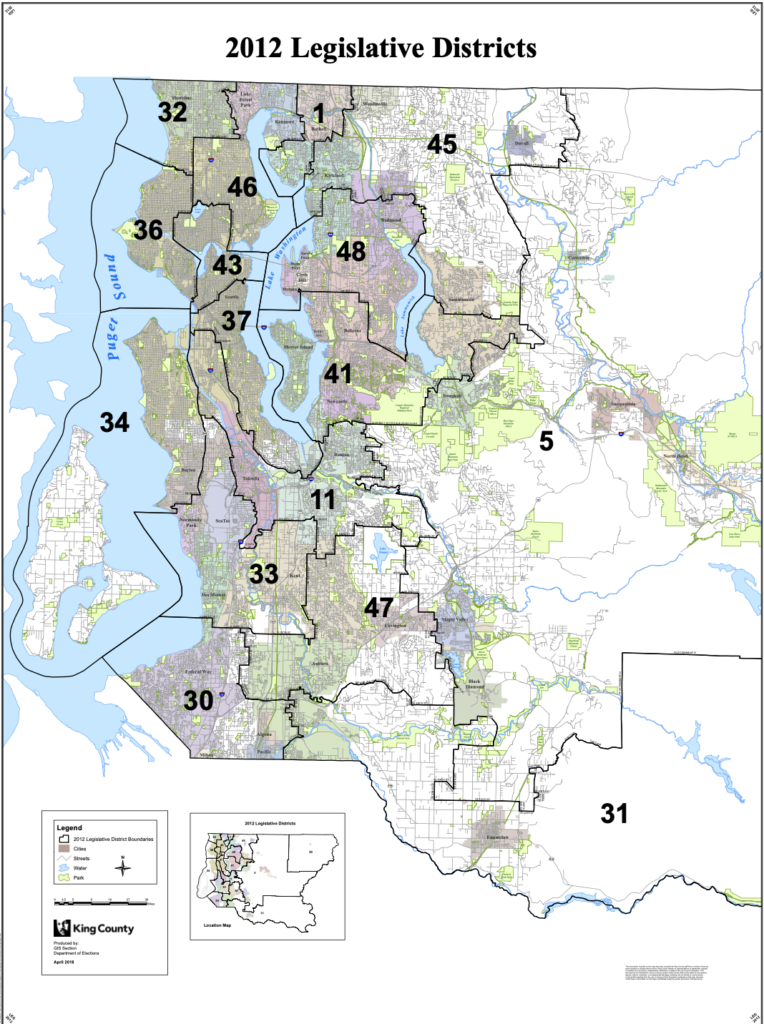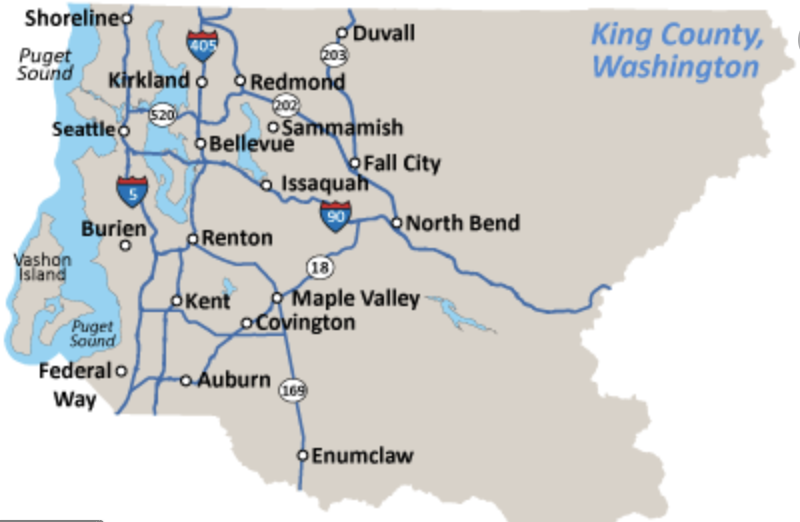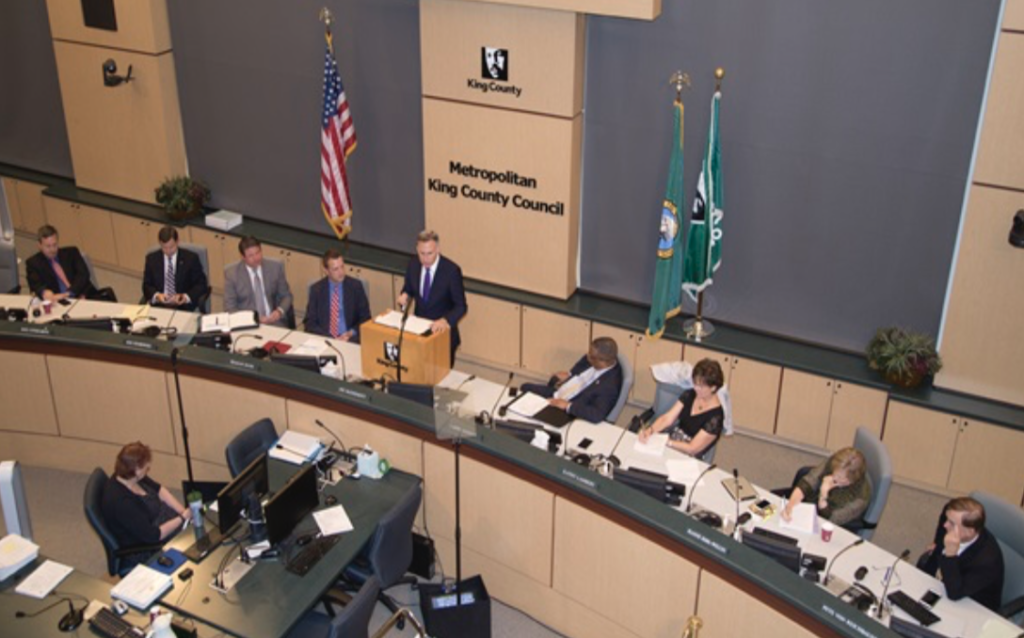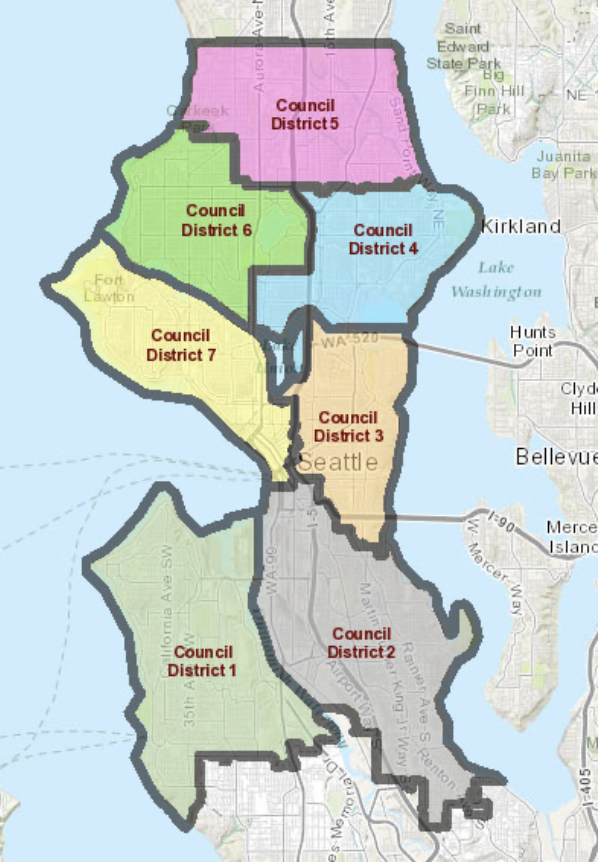Seeking the King County Democrats’ endorsement? Fill out our candidate questionnaire. We are accepting endorsement requests for all offices.
Table of Contents
- We want you to run for office in King County
- King County by the Numbers
- Serving in Local Office in King County
- 3 Steps to Get Started
- What Can I Run For
- Deciding Whether to Run for Office
- The Nuts & Bolts of Running for Local Office in King County
- Resources for Candidates
We want you to run for office in King County!
Our government — local, state, and federal, is made up of everyday people like you. The people on your local school board and city council, state representative, and yes, the President of the United States.
There are more than 600 elected offices in King County, about half of which are up for election every odd-numbered year. More than half of local elected offices are uncontested each election year, and a handful will go unfilled. Why does this matter? Perhaps the current officeholder is doing a great job… but sometimes they are not representing community interests or listening to a diversity of voices and needs, and someone like you can do a better job.
Study after study shows that diverse groups make better decisions. Your unique perspective may be exactly what is needed to help a council, board or commission improve their decision-making.
We need more and better leaders.
Politicians make decisions that affect our lives and our loved ones’ lives every day. From adopting school curriculums to setting utility fees and fines, from land use permits and zoning to economic development policies, from sidewalk placement to preservation of greenspace and parks, people with political power make new policies and laws that shape the way we live.
Those who care most about their community too often do not run for office. Community leaders often stay in the social sector, whether through a nonprofit or a religious institution, or as a volunteer — is that you?
We’d like to help you run for office — we need more compassionate political leaders who understand what the issues are on the ground, not just the people who can easily afford to run for office, are already within a political network or family, or empowered by institutional biases.
Take a moment and think about the causes you feel closest to. How are you uniquely qualified to stand up for this cause? And how have you maybe already started doing so in your community?
By running for office, you’ll be taking a stand for the people and issues you care about in an entirely new way, and at scale. And you will make a difference in people’s lives.
We’re here to tell you to go for it! And we’d love to support you along the way.
This site includes a lot of resources to help you understand what it takes to run for local office. If you’d like us to contact you about a specific elected office or if you have general questions, please fill out this quick survey. We welcome and encourage you to join us in serving the public and fighting for Democratic values.
Have questions? Want to learn more? Click here to let us know what you’re thinking about running for and what questions you have.
Return to the Table of Contents
King County by the Numbers
As of the 2019 Census, there are 2,252,782 residents in King County.
King County is the most populous county in Washington and the 12th-most populous county in the United States.
There are 39 incorporated cities and towns in King County. [There are 281 cities and towns in Washington State.]
There are over 600 elected offices in King County.
Over 300 elected offices (about half of the total 600 elected offices) in King County are up for election every odd-numbered year.
There are 9 Districts that make up the King County Council.
There are 32 Water & Sewer Districts in King County.
17 of Washington’s 49 Legislative Districts (LDs) are partially or entirely in King County. Find your LD here.

Each Legislative District is served by one Senator and two House members in the Washington State Legislature.
The State Legislature is made up of 49 members in the Senate and 98 members in the House of Representatives.
Members of the Senate are elected to four-year terms, and House members are elected to two-year terms. Find your state representatives here.
4 of Washington’s 10 Congressional Districts (CDs) are partially or entirely within King County. Find your Congressional District here.
Return to the Table of Contents
Serving in Local Office in King County
For all positions, candidates must be at least 18 years old and registered to vote in the district they wish to represent. Other conditions may apply depending on the office. The following are the levels of government in King County:
COUNTY LEVEL
King County Executive
The King County Executive is the chief executive officer of the county and has all the executive powers of the county which are not expressly vested in other specific elective officers by the county charter. The Executive serves on boards and commissions, and prepares and submits budgets, legislation and comprehensive plans to the Council for consideration. The Executive is up for election every 4 years. The King County Executive’s position is full-time and the annual salary was listed as $181,227 in 2008.
King County Council
As the legislative branch of county government, the Council sets policies, enacts laws, and adopts budgets that guide an array of services, including:
- The criminal justice system of prosecutors and public defenders, District and Superior Courts, juvenile detention, and adult jails
- The King County Sheriff’s Office, which directly serves residents of unincorporated areas and contracts with many cities to provide police protection
- Public health and human services
- Metro Transit bus service, Water Taxi, King County International Airport (Boeing Field), and county roads
- Wastewater treatment and solid waste management
- Regional parks, open space, and trails
- Elections, records, and licensing
- Appointments to county boards, commissions, and the following positions:
- Auditor
- County Administrative Officer
- Treasury Operations Manager
- Clerk
- Medical Examiner
More about the King County Council
- Learn more at the King County Council website.
- King County Council members are up for election every 4 years. Council members in odd districts were up for election in 2021, while Councilmembers in even numbered districts are up for election in 2023.
- This webpage shows the hundreds of departments, offices, and agencies under the Council’s purview.
- Here is a list of current King County Council Members.
- Council Districts:
CITY LEVEL
Mayor
Mayors manage the operations of their city, often recommending legislative actions and agendas to the City Council. Depending on the city’s structure, the mayor’s responsibilities may include:
- Provide oversight of all departments and appointing department leadership, including police, fire, education, housing, and transportation
- Manage the city budget
- Preside over council meetings
- Veto laws
- If allowed by the city charter, appear at ceremonial events and as a spokesperson for the community
- Propose solutions to address local issues
Some cities require candidates to have lived in the city for 1-2 years. Most mayors serve a four-year term. This can be a part-time or full-time, paid position.
Learn more about serving as Mayor: Mayor & Council Member Handbook.
City Council
As the city’s legislative body, the City Council is responsible for the implementation of programs and services provided by the city, as well as hearing the concerns of local citizens. They decide on basic city policy and act as liaisons between the city and the general public. They also supervise administrative officers, make changes to local ordinances, set the city budget, and consider plans for future development. Depending on the city, council members may be elected by and represent voters throughout the city (serving at-large) or voters in a specific district of the city. Some cities require candidates to have lived in the city for 1-2 years. Most city council members serve a four-year term. This is usually a part-time, paid position.
Learn more about serving as a city council member: Mayor & Council Member Handbook.
School Board
The School Board is the governing body for the school district and is responsible for the educational experience of all students in the local public schools. The School Board hires and evaluates the superintendent, sets district goals and policies, approves the annual budget, negotiates employee contracts, and makes decisions about the curriculum and textbooks. Most school board members serve a four-year term. This is a part-time position and often pays a small amount of money “per diem” based on days worked.
This map shows the boundaries of school districts in King County.
This pdf outlines the responsibilities and professional standards for school board members.
SPECIAL PURPOSE DISTRICT ELECTED POSITIONS
Special Purpose Districts are unique in that they overlap counties. Learn more about them here.
Fire Commissioner
Fire Districts provide fire prevention and suppression services. In some cases, they also provide emergency medical services. Rural fire districts play a particularly important role in forest fire prevention and suppression. Fire commissioners establish district policies, hire and evaluate the fire chief, and approve the annual budget. Fire commissioners serve a six-year term. This is a part-time, paid position.
Water & Sewer Commissioner
Water & Sewer Districts manage the delivery of clean, affordable water to their communities. They play a vital role in local water policy and protecting watersheds. Water & Sewer Districts are sometimes referred to as Water Districts, Sewer Districts, or Utility Districts.
This position is critical to the protection of local water resources. Water & Sewer Commissioners have broad responsibilities, including:
- Establish district policy, set usage rates, and approve the annual budget.
- Oversee the safe disposal of sewage, storm and surface water, and commercial and industrial waste.
- Construct and maintain treatment stations, pumping stations, and other district infrastructure.
In most areas, a single district oversees both water and sewer services. Water & Sewer Commissioners serve a six-year term. This is a part-time, paid position.
There are 32 Water & Sewer Districts in King County. A full listing can be found here.
This map outlines the Water & Sewer Districts in King County.
Hospital Commissioner
Public Hospital Districts deliver health services to local residents. Depending on the district, they may oversee hospital care, nursing homes, urgent care, ambulance services, and health and wellness programs. Hospital commissioners set district policy, approve the budget, and hire and oversee the hospital superintendent. In addition, they are responsible for the financial health of the district, as well as acquiring, constructing, and maintaining district facilities. Hospital commissioners serve a six-year term. This is a part-time, paid position.
These two maps show the boundaries of the Public Hospital Districts in King County: Map 1, Map 2
Parks & Recreation Commissioner
Parks and Recreation Districts manage local parks, facilities, and recreational programs. Parks & Rec commissioners set policies for the district, acquire and manage parkland, approve building and maintenance of recreational facilities, set the district budget, and determine the type and scope of recreational programs. They serve an important role in making sure that programs and public spaces are made available in a way that is fair to everyone. Parks and recreation commissioners serve a six-year term. This is a part-time, paid position.
Port Commissioner
The Port of Seattle is King County’s only Port District — it is a government agency overseeing the seaport and airport of Seattle. With properties ranging from parks and waterfront real estate, to one of the largest airports and container terminals on the West Coast, the Port of Seattle is a leading economic engine in the region. Port commissioners set policies for the district, manage district real estate, set usage rates, and adopt the district’s annual budget. The Port of Seattle is governed by five Port Commissioners who are elected by King County voters — three of the five seats were up for election in 2021, while the remaining two are up for election in 2023. Port commissioners serve four-year terms. This is a half-time, paid position with an annual salary of $48,731.

Return to the Table of Contents
3 Steps to Get Started!
- Determine what Legislative District (LD) you reside in via this link.
- Get involved with your LD’s Democratic Party Organization. Join as a member, attend the monthly meetings, get to know lots of people who also love politics!
- Connect with us on Facebook, Instagram, and Twitter! We promote events and share important information that will support you on your political leadership journey.
What Can I Run For?
King County Elections department will compile the list of all offices subject to election in the general election. Visit the King County Elections department web site for that and more information. Elections for local office are held every odd year. Approximately half of the elected offices are up for election every other election year.
Offices Subject to Election: Complete printable list from King County Elections Office (2023)
There is an Excel spreadsheet format of the same information available at the King County Elections site here. It is titled Comma-delimited format.
Deciding Whether to Run for Office
Talk to people at your LD’s Democratic Organization (find your LD here). Network with people and learn about the position you want to run for.
Talk to people in your life, including your family, to weigh the commitment involved with campaigning for and serving in local office.
Consider the following questions:
- Why should people vote for you?
- What is your experience?
- What are your values?
- What are your positions on important issues?
- How are you different from the current office holder or your opponent (if there is one)?
There are many resources to help you decide whether to run, these are some of them:
Should I Run for Office? 11 Things to Consider if You’re Thinking of Launching a Political Campaign
Check out the Candidate Resources section on this site.
Return to the Table of Contents
The Nuts & Bolts of Running for Local Office in King County
You’ve decided to run, what now?
WHAT TO KNOW BEFORE FILING FOR OFFICE
The official filing window begins on the Monday that falls three weeks prior to Memorial Day and ends on the Friday of that week (5 days). This year “Filing Week” is May 5-9, 2025. The deadline is at 4:00pm on Friday, May 9, 2025.
All local candidates need to file with both:
- The Public Disclosure Commission (PDC). PDC filing can happen at any time. In order to file with the PDC, you will need the following 3 items:
- An Employer Identification Number (EIN) (IRS ID number)
- A public mailing address (likely PO Box)
- A bank account for the campaign
- The Secretary of State. Secretary of State filing is only available during Filing Week.
Verify that you are registered to vote in the district for which you are filing:
Verify that your voter registration information is correct by logging into My Voter Information.
If your registration information is not correct, call King County Elections at 206-296-1565 before starting to file.
The King County Elections Office is an excellent resource and should be used often.
Read the King County Elections’ Candidate Manual.
Read the King County Elections’ one-pager on the PDC.
Subscribe to receive notifications for candidates from the King County Elections here.
Check out their website — there are links to calendars, forms, and critical information.
The King County Elections office staff are very helpful. Call or email them with questions at 206-296-1565 or [email protected].
Required Filing before Filing Week
Within two weeks of doing any of the following, you must file with the Public Disclosure Commission (PDC), Washington State’s campaign finance transparency organization:
- Spend money on your campaign
- Receive money for your campaign
- Announce in public that you are running
In order to file with the PDC, you will need an Employer Identification Number or EIN (an ID number from the IRS), public mailing address (likely PO Box), and a bank account for the campaign.
Learn more here and consider hiring a compliance professional if you are planning to raise more than $5,000 for your political campaign.
Return to the Table of Contents
FILE TO RUN FOR OFFICE!
- File with the Secretary of State. This is only possible during Filing Week.
- File with the Public Disclosure Commission (PDC). PDC filing can happen at any time.
In order to file with the PDC, you will need the following:
- An Employer Identification Number or EIN (an ID number from the IRS)
- A public mailing address (likely PO Box)
- A bank account for the campaign
Return to the Table of Contents
WHAT TO KNOW AFTER FILING FOR OFFICE
Seeking Endorsements from the Democratic Party
A main function of the Democratic Party is to help get Democrats elected to all levels of office.
Once you’ve filed, please seek an endorsement from both:
- Your Legislative District Democratic Organization (LD).
- Your County Democratic Organization (likely King County Democrats, if you’re on this page). Learn more about getting an endorsement from us here and access Candidate Resources here.
Seeking Endorsements from Other Organizations
Fuse WA puts out a Progressive Voters Guide that is distributed to over 2 million voters in Washington. They recommend candidates that have been endorsed by at least one of the partner organizations listed below and seek input from partners and local community members to determine candidates’ values and priorities.
Here is a partial list of organizations* that you may want to consider seeking endorsement from:
- American Federation of Teachers – WA
- Asian Pacific Islander Americans for Civic Empowerment (APACE)
- Civic Alliance for a Progressive Economy (CAPE)
- Equal Rights Washington
- Latino PAC
- M. L. King County Labor Council, AFL-CIO
- NARAL Pro-Choice Washington
- OneAmerica
- OneAmerica Votes
- Planned Parenthood Votes Northwest and Hawaii
- Service Employees International Union
- Sierra Club
- The Stranger
- The Washington Bus
- Teamsters Joint Council 28
- Teamsters Local 117
- The Urbanist
- UFCW 21
- Washington Alliance for Gun Safety
- Washington Bikes
- Washington CAN!
- Washington Conservation Voters
- Washington Housing Alliance Action Fund
- Washington State Labor Council
- WA Federation of State Employees
- WA State Council of Firefighters
- WA State National Organization for Women PAC
*This list matches the list from the Fuse Progressive Voters Guide website.
Other Useful Information
All King County elected offices are non-partisan — you do not have to declare a political party affiliation or as an Independent.
Not all candidates are listed on the primary ballot in August. If only two candidates file to run for a local position, they will run against each other in the November election. If more than two candidates file for a non-partisan office, then all candidates will be on the August primary ballot and the top two vote getters will advance to the November election (candidates are listed in random order on the ballot, not alphabetically).
Return to the Table of Contents
Resources for Candidates
Here’s a list of recommended resources for candidate training and guidance to help you run the strongest possible campaign for local office. These are mobile-friendly links, accessible any time. Some sites require registration, but all of the programs are free or very low cost.
Rise and Run
The Washington State Democrats offer their Rise and Run program to provide local candidates around the state with access to training, expert support, and information about how to apply for voter data from the party.
Deciding to Run
Here’s a free, super-helpful online program to help you decide whether running for local office is right for you, from the National Democratic Training Committee (NDTC).
Messaging & Communications
Strong communication is key to motivating voters. Run for Something’s Communicating Your Message page will help you polish your personal story and establish your public voice.
Campaign Structure, Management, and Compliance
Run for Something’s Launching Your Campaign page is a great guide to thinking about who you need on your campaign team and what tools to consider for managing contacts and contributions.
Fundraising
Learn how to ask for and manage campaign funds, and how to decide if you need a finance committee, in the Raising Money course from NDTC.
Building Your Support Base
You’ll need an efficient system to organize your contacts, donations, and volunteers. This is fundamental and it will help you identify who to contact next as your campaign grows. NDTC walks you through how to do this in the Building Your Network course.
The Voter File
Once you’ve figured out your campaign plan, you’ll need to find people to vote for you! NDTC’s Targeting Voters Course teaches you how to identify the voters you need and strategies for reaching them. If you’ll be using VoteBuilder, there’s a course for that, too.
Voter Contact & Field Operations
Direct contact with voters is the best way to persuade them to vote for you. Learn proven methods and set your campaign volunteers up for success in the Field Tactics course at NDTC.
Campaigning During COVID-19
Campaigns are facing new challenges during the pandemic. Run for Something has a COVID-19 Candidate Support page. Sister District’s Virtual Organizing Hub offers a range of tips and resources for campaigning in the virtual world during social distancing.
Campaign Coaching
Campaign Greenhouse helps local candidates develop goals and stay on track, with affordable weekly coaching sessions and an active Facebook community for sharing ideas and resources.
Additional Resources
If you’re considering running for School Board, NDTC has Eight Tips to Win Your School Board Election. You can also learn here about typical requirements and duties of school board members.
Under 40? Run for Something has a whole program to support you in running for office.
Run for Something also has a candidate guide to Washington campaigns.
The National Council on Independent Living has designed the Elevate: Campaign Training for People with Disabilities program, suitable for any candidate.
Get Her Elected connects women running for office to professionals who volunteer their time to support progressive campaigns.
Vote Mama is a mentorship program that connects Democratic moms with young children to moms who have run for office.



